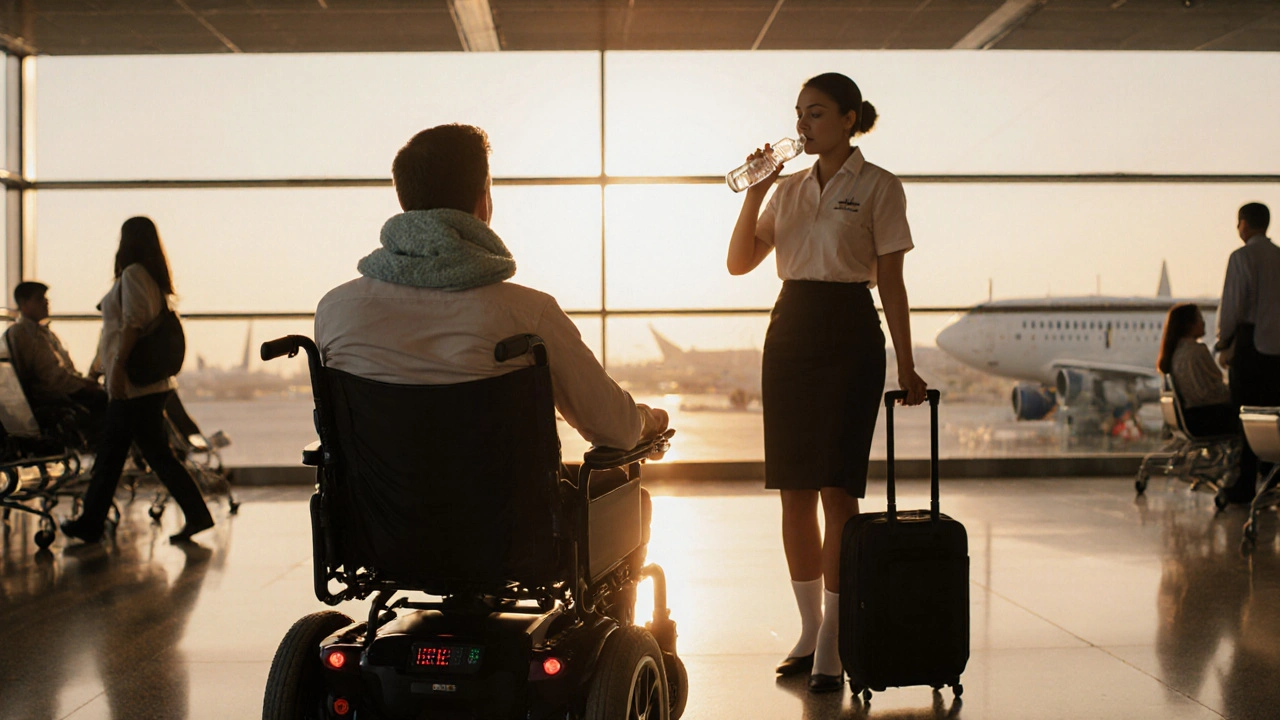CIS Travel Planner
Travel Checklist
Mark off items as you prepare for your trip:
Recommended Destinations
Consider these CIS-friendly destinations:
Coastal Towns (UK)
Mild climate and accessible locations.
Pacific Northwest (US)
Cooler temperatures and excellent healthcare.
Temperate Europe
Well-developed infrastructure and healthcare systems.
Mountain Retreats (Low Altitude)
Short visits with proper hydration and rest.
Travel Insurance Features
Essential features to look for in travel insurance:
Pre-existing Condition Coverage
Ensures medical bills for CIS-related care are paid.
Tip: Choose a policy that explicitly lists "neurological disorders".Medical Evacuation
Provides transport to the nearest specialist if local facilities lack neurology services.
Tip: Check the maximum evacuation amount; aim for at least $150,000.Prescription Refill Assistance
Helps you get medications quickly abroad.
Tip: Look for 24/7 tele-medicine support.Trip Interruption
Covers costs if a relapse forces you to cancel or shorten the trip.
Tip: Read the fine print on what triggers a claim.Emergency Preparedness
Build your safety net before departure:
Medical Summary
Keep a copy of your medical summary on your phone and in a separate bag.
Medical Alert Bracelet
Wear a bracelet listing "CIS – possible MS" and emergency contact numbers.
Hospital Information
Identify the nearest hospital or neurology clinic to your hotel.
Emergency Contacts
Program important numbers into your phone's speed-dial.
Quick Takeaways
- Schedule a pre‑trip check‑up and get a concise medical summary for airlines and doctors abroad.
- Pack a travel‑ready medication kit with doses for extra days, a cooling pouch, and a backup prescription.
- Request wheelchair or seat‑assist services well in advance; most major airports offer them for free.
- Stay hydrated, avoid overheating, and plan rest breaks to manage fatigue and heat‑sensitivity.
- Know the location of nearby hospitals, keep emergency contacts handy, and wear a medical alert bracelet.
Understanding Clinically Isolated Syndrome
If you have Clinically Isolated Syndrome, traveling can feel tricky, but it doesn’t have to be a deal‑breaker. Clinically Isolated Syndrome is a single neurological episode caused by inflammation in the central nervous system, often detected on MRI. While not everyone with CIS progresses to multiple sclerosis, the risk is real, and many experience symptoms like fatigue, vision problems, or tingling.
Having a clear picture of your condition helps you make smarter travel choices. For instance, knowing whether you’re prone to heat‑sensitivity or balance issues will dictate how you pack, which seats you request, and what you’ll need at your destination.
Pre‑Trip Planning: The Doctor’s Role
The first stop before any adventure should be a visit to your neurologist or primary care physician. Ask for a concise medical summary that includes your diagnosis, current medication, known triggers, and preferred emergency treatments. This summary can be turned into a one‑page document that you hand to airline staff, hotel reception, and any local doctor you might see abroad.
During the appointment, discuss the following:
- Potential need for a short‑term steroid burst if you’re worried about a relapse.
- Vaccination schedule - some vaccines can temporarily heighten inflammation, so timing matters.
- Whether a new medication or dosage adjustment is advisable before long journeys.
Ask your doctor to write a brief note for customs or airline personnel that explains why you might need extra time for boarding or a seat with extra legroom.

Packing Smart: Medication & Comfort Gear
Medication management is the cornerstone of a stress‑free trip. Create a dedicated travel kit that includes:
- All daily pills, split into weekly pouches to avoid mix‑ups.
- Two extra days’ worth of meds in case of delays.
- A copy of each prescription, preferably in both English and the language of your destination.
Store the kit in a carry‑on bag - you’ll need quick access at security checkpoints. If any of your medicines require refrigeration, invest in a portable cooler pack and keep it in your bag, not checked luggage.
Other comfort items that can curb fatigue and heat‑sensitivity include:
- Cooling towels or neck wraps - they work wonders on hot flights or sunny days.
- Compression socks - help with circulation and reduce leg swelling during long rides.
- Lightweight, breathable clothing - cotton or technical fabrics keep body temperature stable.
Getting Through Airports and Flights
Air travel is where many CIS patients encounter hurdles, especially when dealing with mobility or fatigue. Here’s how to smooth the process:
- Wheelchair assistance is a free service on most airlines. Request it at least 48 hours before departure via the airline’s website or by calling customer service.
- Ask for an aisle seat near the front of the cabin - it shortens the walk to the restroom and makes boarding easier.
- If you’re prone to heat‑sensitivity, consider a seat with a personal climate control system (available on many long‑haul flights).
- Bring a small snack with protein and complex carbs to sustain energy levels during the flight.
Remember to stay hydrated - the cabin air is dry, and dehydration can worsen fatigue. Sip water every 30 minutes and avoid excess caffeine or alcohol.
On the Road: Managing Symptoms Day‑to‑Day
Once you’re out of the airport, the real test begins. Your daily routine should incorporate a few CIS‑specific strategies:
- Fatigue is the most common symptom of CIS. Schedule activities in the morning when energy levels are highest, and plan a short rest or nap after lunch.
- Heat can trigger a temporary worsening of symptoms. In hot climates, seek shade, wear a wide‑brim hat, and use your cooling towel during midday.
- If dizziness or balance issues arise, sit down immediately and use a sturdy surface - a park bench or a sturdy café table works well.
- Carry a small diary or a notes app to log any symptom changes; this helps you spot patterns and communicate effectively with healthcare providers.

Choosing the Right Destination
Not every vacation spot is equally friendly to a CIS traveler. When selecting a location, weigh these factors:
- Climate - mild, temperate weather reduces the risk of heat‑induced symptom flare‑ups.
- Altitude - high elevations can thin the air and exacerbate fatigue. If you love mountain retreats, limit exposure to a few hours and stay hydrated.
- Accessibility - research whether public transport, museums, and attractions are wheelchair‑friendly or offer ramps.
- Healthcare infrastructure - ensure there’s a reputable neurologist or general hospital within a short drive.
For example, many travelers with CIS find the coastal towns of the UK or the cooler cities of the Pacific Northwest in the US both scenic and symptom‑friendly.
Travel Insurance: Protecting Your Health on the Move
Standard trip insurance often overlooks chronic conditions, so look for a plan that explicitly covers pre‑existing illnesses. Below is a quick checklist to compare policies.
| Feature | Why It Matters | Tips for CIS |
|---|---|---|
| Pre‑existing condition coverage | Ensures medical bills for CIS‑related care are paid. | Choose a policy that lists "neurological disorders" explicitly. |
| Medical evacuation | Provides transport to the nearest specialist if local facilities lack neurology services. | Check the maximum evacuation amount; aim for at least $150,000. |
| Prescription refill assistance | Helps you get meds quickly abroad. | Look for 24/7 tele‑medicine support. |
| Trip interruption | Covers costs if a relapse forces you to cancel or shorten the trip. | Read the fine print on what triggers a claim. |
Emergency Preparedness
Even with flawless planning, emergencies can happen. Build a simple safety net before you leave:
- Store a copy of your medical summary on your phone and in a separate bag.
- Wear a medical alert bracelet that lists "CIS - possible MS" and emergency contact numbers.
- Identify the nearest hospital or neurology clinic to your hotel; note the address, phone number, and whether they accept international insurance.
- Program important numbers (your doctor, a trusted family member, local emergency services) into your phone’s speed‑dial.
When you need urgent care, explain your situation clearly: "I have Clinically Isolated Syndrome, I take medication X, and I’m sensitive to heat." This short script helps emergency staff act quickly.
Frequently Asked Questions
Can I travel by plane if I have CIS?
Yes, most people with CIS fly without issues. The key is to plan ahead: request wheelchair assistance if needed, stay hydrated, and avoid prolonged exposure to hot cabin temperatures.
What should I pack for medication management?
Pack a dedicated travel kit in your carry‑on, include two extra days of medication, a copy of each prescription, and a portable cooler if any meds need refrigeration.
How can I reduce fatigue while sightseeing?
Schedule key attractions for the morning, take short breaks every hour, stay hydrated, and use cooling accessories if it’s warm outside.
Do I need special travel insurance for CIS?
Look for policies that cover pre‑existing neurological conditions, include medical evacuation, and offer prescription refill support. The checklist above helps compare options.
What if I experience a relapse abroad?
Contact your local doctor or nearest hospital immediately, provide your medical summary, and follow your emergency plan. If needed, use your insurance’s medical evacuation service to get you to a specialist.

11 Comments
Matthew Ulvik
Great guide-thanks for sharing! 😊
Michelle Weaver
Your article covers the essentials for CIS travelers, from medication planning to airport assistance 🌟
John Keough
I appreciate the practical tips on staying hydrated and using cooling accessories, they really make a difference on long flights. Also the reminder to schedule a doctor visit before departure is spot on.
Graham Smith
Just a quick note-there’s a small typo in the checklist heading where “pre‑existing” is written as “pre‑exising”. Correcting it helps maintain professionalism.
Jeremiah Morgan
Indeed, the emphasis on pre‑existing condition coverage cannot be overstretched; many insurers overlook neurological disorders, so double‑checking the fine print is indispensable.
nina greer
The cooling towel is indispensable. The compression socks are advisable.
Montague Tilmen
American travelers shouldn’t have to rely on foreign airports for basic wheelchair assistance; our own airlines must guarantee it without extra hassle.
Clarise Wheller
Thanks for highlighting the insurance fine print, I’ll be sure to ask my provider about neurological coverage before I book my next trip.
Riley Fox
Travel, in its very essence, is a negotiation between the body’s limits and the mind’s yearning for discovery.
When one carries a condition like CIS, that negotiation acquires an additional layer of ethical responsibility.
The traveler must articulate a narrative to strangers, transforming personal vulnerability into collective understanding.
Society, in turn, is called upon to construct infrastructures that honor such disclosures without prejudice.
A simple medical alert bracelet becomes a symbol of mutual trust between patient and caregiver.
Yet, the bureaucratic maze of insurance policies often obscures that trust with red tape.
One must therefore become both advocate and scholar, deciphering clauses as if they were ancient texts.
The act of packing a cooling towel is, paradoxically, both a literal and metaphorical preparation for heat.
Heat, like oppression, can trigger hidden flare‑ups, reminding us that comfort is a political act.
Thus, selecting a destination with temperate climate transcends personal preference; it becomes a strategic health decision.
Accessibility in public transport mirrors democratic inclusion, allowing all citizens to partake in cultural exchange.
When a traveler's itinerary includes a wheelchair‑friendly airport, it signals societal progress.
Conversely, neglecting such provisions perpetuates marginalization, reinforcing invisible borders.
In the grand tapestry of human movement, each mindful preparation threads resilience into the fabric of experience.
Embracing this holistic perspective empowers individuals with CIS to traverse the world with dignity and confidence. 😊
David Stephen
I hear your frustration; we should all push for consistent wheelchair assistance across all airlines, regardless of origin.
Roberta Giaimo
Good point, I’ll add the insurance clause to my travel checklist as well, thank you!